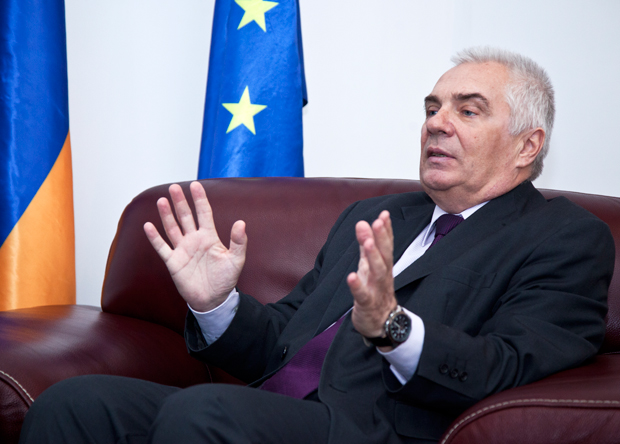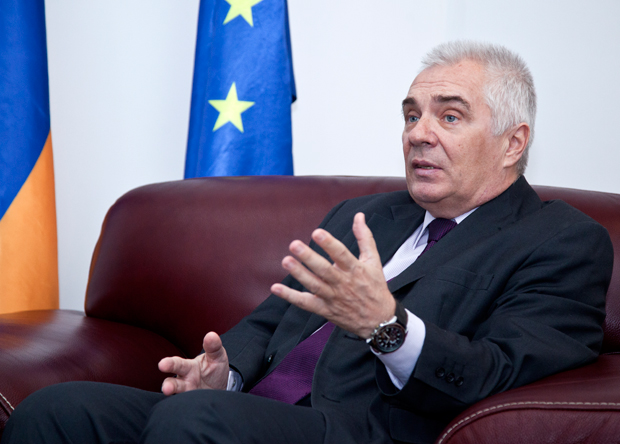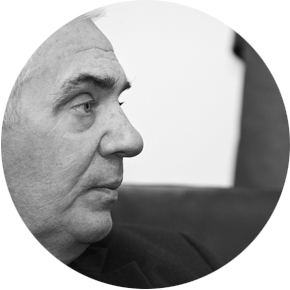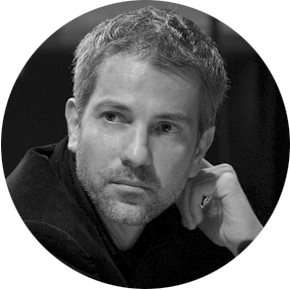Mediamax’s exclusive interview with the Head of the EU Delegation to Armenia, Ambassador Piotr Switalski
- Mr. Ambassador, on April 2 Armenia will be holding parliamentary elections. Each election is important, but can we say that the upcoming elections will have special importance for the future of Armenia-EU ties?
- I have said many times before that the upcoming elections are decisive for the future of the country, and I fully agree with different messages, coming from all parts of political spectrum of Armenia, confirming that all political forces of Armenia approach the elections as very important process which will determine in many ways the future of the country.
One of the aspects, which makes these elections so important, is the fact that Armenia needs deep and comprehensive reforms. Only the government formed on the bases of fair and legitimate elections, has the right, political mandate and legitimacy to go forward with ambitious and deep reforms. So, elections process in a way is necessary precondition for deep reforms that all political forces of Armenia expect and look forward to.
Another aspect is that the upcoming elections will be the most important element in implementation of constitutional reforms as they will mark the transfer to the parliamentary system of governance. So, in many ways they will set some precedents and the tone for the implementation of the constitutional reforms.
Certainly, I think that these elections offer possibility for Armenia to do away with the past, which was marked by controversial assessments of the previous elections. There were very serious accusations about manipulations and rigging. These elections provide Armenia with the opportunity to move closer to the European standards and to open a new chapter in building of democratic future of Armenia.
It is an unprecedented move - in no other country of Eastern Partnership did the European Union decide to extend such a big support, such a big contribution, which sends a signal that we believe that these election are important.
The European Union has decided to support strongly the implementation of the electoral deal between the government coalition and some opposition parties. The European Union allocated up to EUR 7 mln to implement the electoral deal between the government and the opposition parties. It is an unprecedented move - in no other country of Eastern Partnership did the European Union decide to extend such a big support, such a big contribution, which sends a signal that we believe that these election are important. If Armenia wants to build a better future, a democratic future, it can always count on EU support.
- Armenian leaders are saying that they want to have the “best election in Armenia’s history”. However, the critics say that they tell this before every election. What is your impression?
- We believe that the very fact that back in February 2016 the government coalition decided to open talks with some opposition parties and civil society indicates that indeed these declarations about Armenia preparing for the best elections ever is sincere and really intended in good faith. The process was not easy: there were ups and downs, but the result is quite impressive. Even if the first deal, achieved in the beginning of June, was abandoned, a new deal was made in September.
We believe that the arrangements, which were agreed upon, are very significant. The introduction of the vote identification machines will help to eliminate some of the methods of rigging of the elections, which we know from the past of many countries. The machines will prevent multiple voting or proxy voting. Publication of the voter lists will prevent the inflation of the voter lists. So called “dead souls” were considered by many opposition parties to be the main method of rigging the elections in the past.
This deal, compiled with the installation of video cameras, which will help to monitor the situation inside the polling stations is very important. The video cameras, for instance, can address some issues, which were reported in the past about the mistreatment of the observers or misbehavior of election commission members or law enforcement officers. Without overestimating the importance of the deal, we believe that the very fact that for the first time opposition parties, even if not all of them, and the government coalition were together for many months negotiating seriously on how to eliminate the possibilities for rigging the elections is very important politically, because it is unprecedented in the whole European Neighborhood area. This deal is indeed unprecedented.
So called “dead souls” were considered by many opposition parties to be the main method of rigging the elections in the past.
Will it eliminate all possibilities of election fraud? Of course, not. And we, as the donors, have no illusion. Therefore, in a statement, issued by the European Union, we put the emphasis on eliminating the other possibilities for electoral fraud. What other possibilities? We have very good account of bad practices in the past from international observers, from Armenian observers and other sources.
One aspect is the use of administrative resources. It would be bad, if the image of the elections is tarnished by different attempts to use administrative resources in different ways to influence the choice of the voters. Electoral Code of Armenia contains a number of clear provisions prohibiting the immediate use of administrative resources. But sometimes people, even on their initiative, still attempt to do it. For instance, a headmaster of a school in a country uses the meeting of pupils’ parents to advise the parents, who they should vote for. It is a clear use of administrative resources. Schools should be free from electoral campaign. When such signals of use of administrative resources of different sorts appear, it is the duty of law enforcement, of the Electoral Commission to act upon such cases, to clarify and sometimes, if necessary to take the proper actions. If there is no action, then it may put in jeopardy all this big effort, because sometimes such examples are overblown, sometimes such bad examples of use of administrative resources are used as an argument to challenge the whole result of the elections, which I see would not be good.
 Piotr Switalski
Piotr SwitalskiPhoto: Mediamax
Another example is electoral corruption. In many countries politicians are tempted to persuade voters to buy their favors, and this not only the privilege of the incumbents, people who are actually holding power. In many transition countries, in particular people, who were rich enough, tried to use money, assets in order to buy the favors of the electorate. Again, when you look at the Armenian legislation, there are very strong provisions, prohibiting, even indirectly promising money services for fraud, but again it is the duty of judicial system and law enforcement to act upon such cases. If tolerated, they may tarnish the image of the elections. These issues are not covered in the deal between the opposition and the government, but they are important.
Another important aspect is the provision of the Electoral Code, which is considered by civil society organizations as being restrictive on the work of the observers. When I talked to the government representatives, they said that this was not the case, there was no evil intention, but we will see. It is important to give the feeling that the observation can be conducted in a free spirit without any pressure, intimidation or administrative restriction on the work of the observers.
And the final point is electoral disputes. There is no country in the world, where you can have perfect elections. Even the most established democracies sometimes have to confront allegations or even proved evidences of attempt of manipulation, and distortion of the process. And then comes the good process of the pleading for examining of these reports or sometimes formal complaints. It has to be fair, it has to be based on normal administrative and judicial procedures, which will give the feeling that these controversies can be dealt in a fair manner. We must be prepared that there will be always people who will complain. They have the right to complain, but when you have a fair procedure for lodging complaints, discussing, examining the evidences and therefore passing the verdict, then it is ok.
- Critics also say that EU and other international partners often “close their eyes” to the irregularities during the elections in Armenia and are somehow responsible for the current state of affairs in the country. What will be your response?
- First of all I want to stress that we always follow the democratic processes in all countries of the neighborhood with utmost attention. We know what is happening and we never close our eyes. Of course, the political conclusions that we are drawing in shaping the policies towards individual countries is another story, but we always try to be fair.
In the past the European Union has always shared with the Armenian Government our perception of the elections, based on the international observations.
We cannot force Armenia to take this or that political choice. If Armenia chooses another path, what can we do?
What kind of political conclusions we can draw from upcoming elections is another story. We want to work with positive scenarios. It’s not a secret that if the elections are conducted in a fair, transparent and just manner, it will improve the image of Armenia, and it will open inevitably, as was the case with other countries, new possibilities for cooperation and channeling additional development assistance. We would welcome Armenia to be closer to European standards and to be interested in large cooperation with the European Union. But we are pragmatic in the sense that it is always the sovereign choice of Armenia. We cannot force Armenia to take this or that political choice. If Armenia chooses another path, what can we do?
- I think the issue of corruption is directly linked to the elections. When you arrived to Armenia, you said that fight against corruption would be your top task. You’ve been working in Armenia for a long time now. Do you see any changes in this sphere and is the corruption still your priority?
- We consider corruption as one of the most important systemic obstacles for development of Armenia: for the political system, for the economic governance and judicial sphere – for all aspects of the functioning of the society. Therefore, the European Union has invested so much in supporting the fight against corruption. Altogether we allocated EUR 15 million to help the Armenian Government fight corruption.
Are we satisfied with the outcome? To some extent we regret very much that not all of this allocated money could be transferred to the budget of Armenia, because the Armenian side in the past failed to meet the jointly agreed conditionalities. Only around 50% of the money allocated was transferred to Armenia because of the failure of the Armenian side to achieve these anti-corruption targets.
 Piotr Switalski
Piotr SwitalskiPhoto: Mediamax
The recent months have been quite encouraging, however. First of all, the narrative has changed. The leading politicians, including the new Prime Minister, some key Ministers in the Government and other leaders have started talking explicitly about the urgency to fight corruption. It’s very important that now we can say the diagnosis of the situation on the Armenian Government’s side and the EU Delegation is the same. We are equally critical when defining the problems and the gravity of the situation, and that’s very good. That is a big change.
I think that a number of initiatives undertaken, including the new laws passed recently in the Parliament, the strengthening of the work of the Ethics Commission, including the responsibility for late or inaccurate asset and income declaration, are something we welcome. The illicit enrichment legislation is something we applaud very much. We know that the government is actively working on some other initiatives, including the one which has been our main suggestion for the past years – the establishment of an independent anti-corruption agency. We know that the government is working very intensively now together with the civil society on developing a model of this agency for Armenia.
The leading politicians, including the new Prime Minister, some key Ministers in the Government and other leaders have started talking explicitly about the urgency to fight corruption.
We are aware of very serious effort by the Government to develop a concept and adopt legislation on another weak point of Armenia – the concept of the conflict of interest. I can say that the developments in recent months, in particular after the change of Government, have been very encouraging. We supported very much and we want to continue our support to these initiatives.
- Right diagnosis is good and sharing it is also good, but the treatment is much more important. When you talk to ordinary people, they say they want to see real punishment for the crimes. When someone loses his job because he was taking bribes, losing the position is not enough and people want this official to go to jail. But when you talk to senior Armenian officials, they say “we can’t put everyone in jail”. Do you think there’s a chance to find proper balance between what the public wants and what should be done?
- The experience of other countries, who have passed through the transition period and who have been exposed to various corruption risks, is clear. When you look at countries like Poland, Romania, even some countries in the Post-Soviet space, it is clear that the fight against corruption can be successful when it starts from the top. The public officials of different sorts bear special responsibility, and without addressing the corruption issues at the top level the population will never gain the necessary confidence that it is serious and comprehensive. I think that sooner or later the Armenian fight against corruption will have to show that it is fair and comprehensive.
In Poland former Ministers had to serve quite serious sentences in prison for corruption crimes. I don’t want to somehow prejudge how this aspect will be tackled here, in Armenia. It is a sovereign decision by Armenia. I hope very much that the new anti-corruption agency will be comprehensive in its activities and will tackle different aspects of corruption. One aspect is the petty corruption, which ordinary citizens have to confront in everyday life at offices, medical and educational institutions.
The public officials of different sorts bear special responsibility, and without addressing the corruption issues at the top level the population will never gain the necessary confidence that it is serious and comprehensive.
In many countries petty corruption is still quite pervasive. It’s very difficult to get rid of it because it’s deep in the mentality of the people, but on the basis of experience of some other countries it can be done. I can cite the example of Poland where the petty corruption in traffic police and health institutions has been essentially eradicated, although it was very widespread twenty five years ago.
We have different dimensions of corruption, and of course, you have the so-called meta-corruption, which relates to this quite unhealthy merger of political and economic interest. The good example of this meta-corruption was Ukraine, which was very low on the anti-corruption perception interest. They had to confront the situation where politicians and oligarchs were in one big network of interests, which resulted in mass corruption at the top. Armenia is not Ukraine, for different reasons, and Armenia is doing a lot better than other members of the Eurasian Economic Union, but still, this is one of the aspects where public discussion will inevitably emerge.
The initiatives in the recent months, the narrative of the Prime Minister and the top officials in Armenia is very encouraging, and we as the European Union stand ready to help.
- Do you see any direct or indirect link between the elections and the new Framework Agreement to be signed between Armenia and the EU? Do you think that the new Framework Agreement could be signed before the elections, or the EU would like to see the elections outcome?
- I can tell you very openly that the European Union is not bound by any calendar, in particular, political calendar of Armenia, in negotiating such agreements. What we are ready to do is to work, to finalize the Agreement as soon as possible, as was declared in the outset by High Representative Mogherini. The negotiations are in the final stage, which means that the number of open issues is very limited, but some tough issues still remain. They require a lot of efforts, and sometimes - political decisions. But generally, I think that the progress has been quite positive.
Whether we have enough time to finalize the Agreement well before the elections is an open question, but what I can confirm is that on both sides there is willingness to achieve the outcome as soon as possible.
- Those tough questions are related mainly to trade issues?
- There are some issues in the political chapters, very few, which are still open. There are also some tough, open questions in the trade part and sectoral cooperation. Of course, trade and sectoral cooperation issues have a very tangible, material dimension; therefore, they will require very careful consideration.
Ara Tadevosyan talked to Piotr Switalski





















